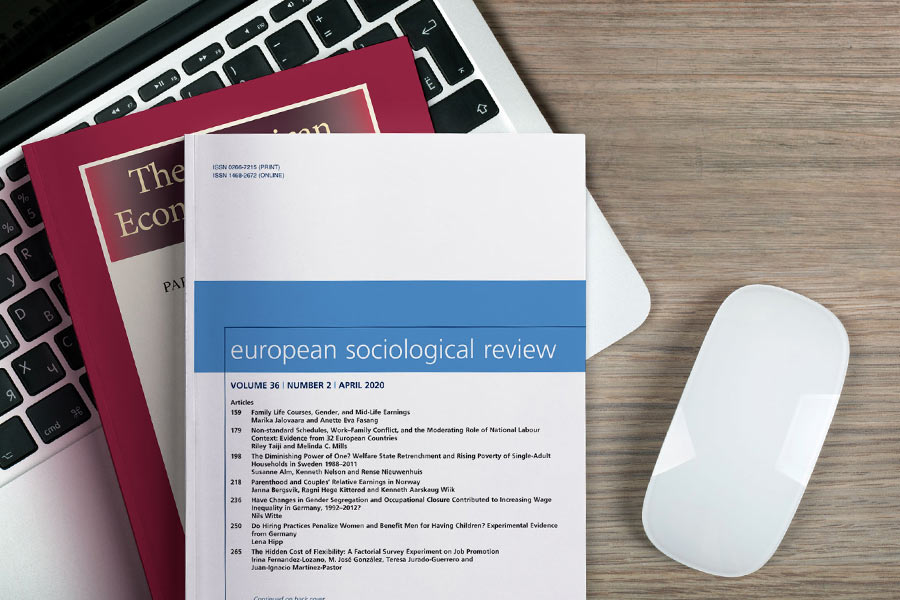Total hits 17.437
-
Die Einbindung von Beschäftigten in die Systeme der betrieblichen Mitarbeiterbeteiligung und Altersvorsorge
Bellmann, L. & Möller, I. (2001): Die Einbindung von Beschäftigten in die Systeme der betrieblichen Mitarbeiterbeteiligung und Altersvorsorge. In: Personal : Zeitschrift für Human Resource Management, Vol. 53, No. 10, p. 554-557.
-
Neue Bundesländer: Einflussfaktoren der Regionalentwicklung
Blien, U., Blume, L., Eickelpasch, A., Geppert, K., Maierhofer, E., Vollkommer, D. & Wolf, K. (2001): Neue Bundesländer: Einflussfaktoren der Regionalentwicklung. Nürnberg u.a., 76 p.
-
Qualifikation und die Chancen auf dem deutschen Arbeitsmarkt
Reinberg, A.; Wilkens, H. (sonst. bet. Pers.) (2001): Qualifikation und die Chancen auf dem deutschen Arbeitsmarkt. Entwicklungen, Perspektiven und Hintergründe. In: (2001): Bildungsreform aus ökonomischer Sicht : 63. Wissenschaftliche Tagung der Arbeitsgemeinschaft deutscher wirtschaftswissenschaftlicher Forschungsinstitute vom 11. und 12. Mai 2000 (Beihefte der Konjunkturpolitik, 51), p. 11-27.
-
Wage curve analyses of establishment data from Western Germany
Bellmann, L. & Blien, U. (2001): Wage curve analyses of establishment data from Western Germany. In: Industrial and Labor Relations Review, Vol. 54, No. 4, p. 851-863.
-
Bekanntheitsgrad und Bewertung des Sofortprogramms zum Abbau der Jugendarbeitslosigkeit
Dietrich, H. & Rothe, T. (2001): Bekanntheitsgrad und Bewertung des Sofortprogramms zum Abbau der Jugendarbeitslosigkeit. (IAB-Werkstattbericht 13/2001), Nürnberg, 15 p.
-
Die Herausforderung der Selbstregulation
Minssen, H. (2001): Die Herausforderung der Selbstregulation. Kooperation und Kontrolle in Fertigungsgruppen. In: L. Bellmann, H. Minssen & P. Wagner (Hrsg.) (2001): Personalwirtschaft und Organisationskonzepte moderner Betriebe : IAB-Kontaktseminar vom 11. bis 15.12.2000 am Institut für Arbeitswissenschaft der Ruhr-Universität Bochum (Beiträge zur Arbeitsmarkt- und Berufsforschung, 252), p. 85-108.
-
Arbeitszeitsouveränität in Dienstleistungstätigkeiten
Voss-Dahm, D. (2001): Arbeitszeitsouveränität in Dienstleistungstätigkeiten. Eine Betrachtung aus transaktionskostentheoretischer Sicht. In: L. Bellmann, H. Minssen & P. Wagner (Hrsg.) (2001): Personalwirtschaft und Organisationskonzepte moderner Betriebe : IAB-Kontaktseminar vom 11. bis 15.12.2000 am Institut für Arbeitswissenschaft der Ruhr-Universität Bochum (Beiträge zur Arbeitsmarkt- und Berufsforschung, 252), p. 15-32.
-
Beschäftigung im Umweltschutzsektor Ostdeutschlands
Komar, W. (2001): Beschäftigung im Umweltschutzsektor Ostdeutschlands. Eine Analyse auf der Basis des IAB-Betriebspanels. In: Wirtschaft im Wandel, Vol. 7, No. 13, p. 320-325.
-
Employment that is inappropriate for the qualifications as a consequence of industry-specific training strategies
Büchel, F. & Neubäumer, R. (2001): Ausbildungsinadäquate Beschäftigung als Folge branchenspezifischer Ausbildungsstrategien. In: Mitteilungen aus der Arbeitsmarkt- und Berufsforschung, Vol. 34, No. 3, p. 269-285.
-
Kurzlebige Moden oder dominierende Arbeitsgebiete
Kabst, R. (2001): Kurzlebige Moden oder dominierende Arbeitsgebiete. Personalpraktiken zwischen Wiedervereinigung und Jahrtausendwechsel. In: L. Bellmann, H. Minssen & P. Wagner (Hrsg.) (2001): Personalwirtschaft und Organisationskonzepte moderner Betriebe : IAB-Kontaktseminar vom 11. bis 15.12.2000 am Institut für Arbeitswissenschaft der Ruhr-Universität Bochum (Beiträge zur Arbeitsmarkt- und Berufsforschung, 252), p. 1-14.
-
Fachkräftebedarf und unbesetzte Stellen
Kölling, A. (2001): Fachkräftebedarf und unbesetzte Stellen. Ergebnisse des IAB-Betriebspanels 2000. In: Personal : Zeitschrift für Human Resource Management, Vol. 53, No. 9, p. 512-517.
-
Reorganisation und Geschlechterpolitik
Kutzner, E. (2001): Reorganisation und Geschlechterpolitik. Handlungsmöglichkeiten von Frauen bei der Gestaltung von Gruppenarbeit. In: L. Bellmann, H. Minssen & P. Wagner (Hrsg.) (2001): Personalwirtschaft und Organisationskonzepte moderner Betriebe : IAB-Kontaktseminar vom 11. bis 15.12.2000 am Institut für Arbeitswissenschaft der Ruhr-Universität Bochum (Beiträge zur Arbeitsmarkt- und Berufsforschung, 252), p. 109-132.
-
Unternehmens- und Betriebsorganisation des deutschen Maschinenbaus im Umbruch?
Widmaier, U. (2001): Unternehmens- und Betriebsorganisation des deutschen Maschinenbaus im Umbruch? In: L. Bellmann, H. Minssen & P. Wagner (Hrsg.) (2001): Personalwirtschaft und Organisationskonzepte moderner Betriebe : IAB-Kontaktseminar vom 11. bis 15.12.2000 am Institut für Arbeitswissenschaft der Ruhr-Universität Bochum (Beiträge zur Arbeitsmarkt- und Berufsforschung, 252), p. 33-49.
-
Das Modell arbeitsmarktbezogener Zuwanderung der Zuwanderungskommission
Bogai, D. (2001): Das Modell arbeitsmarktbezogener Zuwanderung der Zuwanderungskommission. In: Wirtschaftsdienst, Vol. 81, No. 9, p. 506-512.
-
Die große Hoffnung für das 21. Jahrhundert?
Baethge, M. & Wilkens, I. (eds.) (2001): Die große Hoffnung für das 21. Jahrhundert? Perspektiven und Strategien für die Entwicklung der Dienstleistungsbeschäftigung. Opladen: Leske und Budrich, 431 p.
-
Turbulenzen im IT-Arbeitsmarkt
Dostal, W. (2001): Turbulenzen im IT-Arbeitsmarkt. In: Informatik-Spektrum, Vol. 24, No. 4, p. 207-217.
-
Betriebliche Flexibilisierung und Beschäftigungsstabilität - ein Widerspruch?
Gerlach, K., Hübler, O. & Meyer, W. (2001): Betriebliche Flexibilisierung und Beschäftigungsstabilität - ein Widerspruch? In: L. Bellmann, K. Gerlach, O. Hübler & W. Meyer (Hrsg.) (2001): Beschäftigungseffekte betrieblicher Arbeitszeitgestaltung (Beiträge zur Arbeitsmarkt- und Berufsforschung, 251), p. 141-181.
-
Wandel der Arbeitsvermittlung durch Deregulierung
Konle-Seidl, R. & Walwei, U. (2001): Wandel der Arbeitsvermittlung durch Deregulierung. In: X. Scheil-Adlung (Hrsg.) (2001): Gestaltung der sozialen Sicherheit : die Rolle der Privatisierung (Soziale Sicherheit, 03), p. 317-329.
-
Vom Seminarwesen zur arbeitsintegrierten Kompetenzentwicklung
Kailer, N. (2001): Vom Seminarwesen zur arbeitsintegrierten Kompetenzentwicklung. Neue Anforderungen an Führungskräfte und PersonalentwicklerInnen. In: L. Bellmann, H. Minssen & P. Wagner (Hrsg.) (2001): Personalwirtschaft und Organisationskonzepte moderner Betriebe : IAB-Kontaktseminar vom 11. bis 15.12.2000 am Institut für Arbeitswissenschaft der Ruhr-Universität Bochum (Beiträge zur Arbeitsmarkt- und Berufsforschung, 252), p. 271-277.
-
Arbeitssituation, Tätigkeitsprofil und Qualifikationsstruktur von Personengruppen des Arbeitsmarktes
Biersack, W., Dostal, W., Parmentier, K., Plicht, H. & Troll, L. (2001): Arbeitssituation, Tätigkeitsprofil und Qualifikationsstruktur von Personengruppen des Arbeitsmarktes. Ergebnisse der BIBB/IAB-Erhebung 1998/99 im Überblick. (Beiträge zur Arbeitsmarkt- und Berufsforschung 248), Nürnberg, 528 p.



